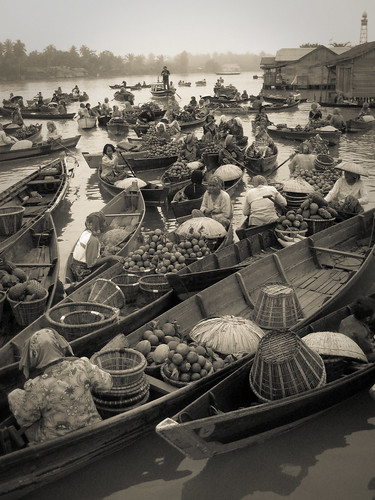Beatriss, Tetsukichi & co. arrived in Pasar. At once a cosmopolitan, lakeside market city and an overgrown fishing village with drainage problems, Pasar provided an easy answer to the travelers most immediate needs—anyone with money can find food and a comfortable place to sleep.
All but the simplest communication is difficult. Few of the locals speak Zhou. The foreign merchants who do come from the Southern Empire and they use a pronunciation very different from what Beatriss and Tetsukichi learned in the North. Another set of merchants share Al-Fitar’s religious beliefs (One Law) and can exchange scriptural references, but unlike al-Fitar, few of these merchants know the religious language well enough to use it for general conversation.
Despite this, “Gwinch, the cursed blessing” is a hot topic of conversation.
Although there are conflicting rumors, most people seem to believe that Gwinch left town about a month ago after getting involved in a violent clash between rival temples and rival merchant guilds. Some believe that he was killed in the fighting while others believe he gone into hiding, either as a member of a an emergent mercenary gang known as the Black Flowers, or in some other capacity.
Gwinch’s intial appearance in Pasar was not unexpected. There were legends about a foreigner who would revive an ancient empire based in Tempat Larang. Both General Goyat and Governor Kawabi had expressed keen interest in these legends when their rival armies tore through Pasar.
During most of his stay in Pasar, Gwinch’s conduct supported the theory that his part in fulfillment of ancient prophecies, if any, was likely to be benign. He presented himself as a monk and attached himself to the monastery of the Two-Fold Path—one of many “second-tier” sects that had representatives in Pasar.
The quiet, respectful presence of Gwinch and his companions raised the status of his sect, with the result that the Two-Fold Path was chosen as the site for conciliatory negotiations between two rival merchant guilds. In the past, this honor had alternated between the Shining Path and One Law Temples. The appearance of bias had always been a problem. Most members of the Silk Guild made their largest offerings to the Shining Path Temple. And most members of the Spice Guild were One Law adherents. So it seemed like a really good idea . . .
By all accounts, things did not go well, and while there are differing opinions on who instigated the violence that disrupted the negotiations at the Two-path monastery, all agree that the leader of the Spice Guild was killed. Every witness had a different explanation of how this happened, and so, rather than punish any one individual, the Elders of Pasar visited collective punishment on the Two-Path monastery for failing to preserve the peace. The abbot and half of the monks were to be banished for one year. The Two-Path monks responded in a way that seemed to confirm their guilt—by attacking and ransacking the Shining Path Temple. Monks from the Shining Path retaliated, and the Two-Fold Path was all but obliterated from Pasar. The remnant was eager for the protection offered by a band of former soldiers that soon began calling itself the Black Flowers. This group has not been good for Pasar.

No comments:
Post a Comment